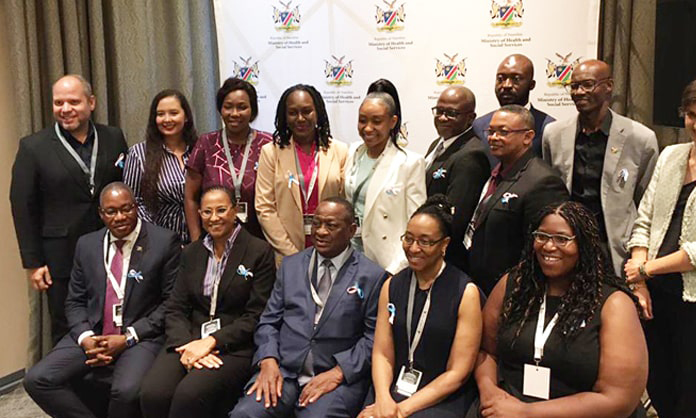Health and social services minister Kalumbi Shangula says breast cancer accounts for nearly 20% of all cancers in women.
“These statistics are staggering and underscore the need for greater awareness, early detection and treatment of these diseases,” Shangula said at the launch of the ministry, African-Caribbean Cancer Consortium and Pfizer research project on breast and prostate cancer in Windhoek on Monday.
Statistics from the World Health Organisation (WHO) indicate that breast and prostate cancer are two of the most common cancers worldwide, and the second leading cause of cancer deaths in women and men, respectively.
Shangula said the impact of breast and prostate cancer on individuals, families, and communities cannot be overstated as these illnesses can cause physical and emotional pain, financial strain and social isolation.
“The aim of this research project is to understand why these disparities exist and identify factors that contribute to the differences in health outcomes,” Shangula said.
Although breast cancer can be detected early through regular mammography screenings, it is often only detected when it has already spread to other parts of the body. This is why it is important for women to be aware of the signs and symptoms of breast cancer and to undergo regular screenings, Shangula said.
“These symptoms may include a lump or thickening in the breast, nipple discharge, or changes in the shape or texture of the breast,” Shangula said
“When a woman detects any of these symptoms, she must seek medical assistance.”
Namibia has the capacity to screen and detect breast cancer at an early stage and to initiate early treatment.
Shangula said people of African descent are disproportionately affected by these diseases, with higher incidence and mortality rates compared to other ethnic groups.
He highlighted that the success of this project will depend on the support and collaboration of various stakeholders, including institutions of higher learning, healthcare providers, both in the private sector and in national laboratories.
“However, with greater awareness and early detection, we can reduce the burden of these diseases on our society,” Shangula said.
Breast cancer begins when abnormal cells grow uncontrollably in the breast tissue.
Breast cancer is the leading cause of cancer deaths among women worldwide, with an estimated 685 000 deaths in 2020 alone.
Speaking at the same event, executive director in the health ministry Ben Nangombe said more than 80% of the Namibian people depend on the public health sector.
He said the burden and impact of breast and prostate cancer in Namibia is seen and felt by healthcare providers who provide care for patients.
“We are expressing a resolve to make a difference. A difference in the fight against these cancers, through quality research to close the gaps in research data, whose outcomes will undoubtedly posit solutions, which will give the world answers, for effective, sustainable and lasting interventions,” Nangombe said.
Chief executive officer of the Namibia Institute of Pathology Kapena Tjombonde highlighted that there is a dire need for an intensified drive to enhance capacity on all fronts, to be ahead of the game.
“…the research project will help close the gaps between the health outcomes of breast and prostate cancers, as well as understanding their general make-up of genetic and molecular drivers,” Tjombonde said.
The breast and prostate cancer project is the first step in understanding the root causes of these disparities, Tjombonde said.
Tiffany Miller, a staff member of the US ambassy in Windhoek said the project is a valuable extension of the work of the US President’s Emergency Plan for AIDS Relief (Pepfar).
The research project will create a platform for collaboration and information-sharing between researchers, healthcare professionals, and other stakeholders in various countries in the fight against breast and prostate cancer at national and international level.
The Namibian research team is led by Pueya Nashidengo, who is the principal investigator.
Nashidengo will be assisted by his co-investigators John Abebrese and Nguundja Uamburu. They will be assisted by the Namibian Institute of Pathology project focal persons led by Iyaloo Konstantinus and Fredrik Kidaga.
Stay informed with The Namibian – your source for credible journalism. Get in-depth reporting and opinions for
only N$85 a month. Invest in journalism, invest in democracy –
Subscribe Now!







